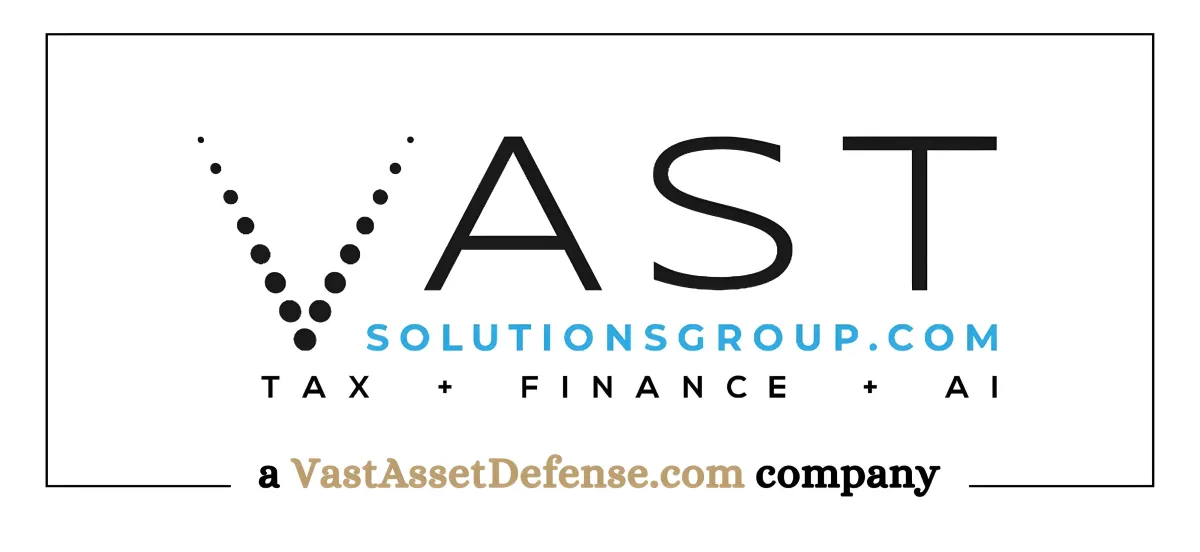Tax + Finance + AI
Modern Tax Strategy for the Modern Entrepreneur
Tax &
Strategy
Paying too much tax?
Commercial Property Finance
Need real estate money?
Advanced Business AI Automation
Want AI help?
Help is here!
VastSolutionsGroup.com (based on Bainbridge Island, WA) - the award winning tax strategy consulting firm which has been mentioned on NBC, Fox News, and ABC - is led by R. Kenner French, a former Forbes.com small business contributor, Tax & AI Contributor to The AI Journal, three-time author, and keynote speaker.
The firm now has offices and affiliates all over the US - and beyond. It has come a long way from its humble beginnings when started by Gary Koontz in 1969 as Seamount Financial Group.
With a team of attorneys, CPAs, and professional advisors, it is THE pioneer in applying artificial intelligence technology to help entrepreneurs lower tax liability and prepare for retirement - and it has been for years.
Today, services also include commercial property finance, qualified plan consulting, risk analysis, M&A, and many more added value matters important to the modern day entrepreneur.
It is a co-founding partner of VastAssetDefense.com, helmed by noted attorney Bob Bluhm, which also has the goal of assisting entrepreneurs in their daily struggles to mitigate taxes, increase financial assets, and help preserve them.
Our Services
A national company with local pride
Offices in every state

Tax Strategy
PROACTIVE tax strategies that few professional advisors utilize.

Finance
It can be either personal, business, commercial property finance, or retirement consultation you need, and we are here to help.

Artificial Intelligence
Our advanced property artificial Intelligence system we call "Einstein" is part of an automation system we have used internally for years and can help clients with any number of business challenges.

Mergers & Acquisitions
If you are selling or buying company we are here to save or optimize your outcome.

Risk & Financial Advisory
We are captive consultants here to reduce your risk and prepare you for restful nights.

Qualified Plans
Third party administration of 401(k), profit sharing, and defined benefit plans.
Why Choose Us?
We are the best. PERIOD.

We Believe in Proactive Planning

We Use Sophisticated Approaches

We Believe YOU Come First
Easy Process
How it works
First Step
Second Step
Third Step

Plan
Without planning, you end up nowhere.

Produce
Produce the the results in line with the plan.

Protect
Protect the great results of the plan and production.
Choose Your Tax Strategy Consultation Package
Consulting Services that work for YOU.
In addition to our list of specific services, we also offer bundled tax strategy packages that make it easy to assemble our services in core products.
Basic Tax Strategy
$ 2,999
Annually
Basic Consultation
Proactive Tax Strategy
Proactive Financial Strategy
Content Support
Enhanced Tax Strategy
$ 4,999
Annually
All in Basic +
Enhanced Consultations
Tax Preparation of 1 Personal/1 Biz
Email Support
Enterprise Business
$ 10,999
Annually
All in Enhanced +
Enterprise Consultations
Monthly Bookkeeping
Enterprise Support
Join the Vast Vault
a VastSolutionsGroup.com community
For only $199 a month, an entrepreneur gets added value content, consultation, a solid community and a key to enter a Vault where all the secrets will be told...
Testimonials
Our Clients Reviews
Why didn’t we do this (strategy) a long time ago? Well, we did not meet Vast a long time ago.

Clarissa Tongia
Entrepreneur
NYC, NY
I have never had anything run so efficiently with paperwork and getting something done. Your whole system is incredible.

Anna Otton
Entrepreneur
Denver, CO
Join the best company EVER (we think)
Ready to:
Ditch the 9-5 grind and pursue your passion?
Master cutting-edge strategies to empower entrepreneurs?
Finally achieve the work-life balance you deserve?
We offer the tools and support you need.
Events
Join the ModernMillions.ai Book Tour with R. Kenner French—live events across the U.S. revealing AI-driven tax strategies and automation secrets to scale smarter.
Headquarters
755 Winslow Way East, Suite 101, Bainbridge Island WA 98110
Call
(415) 212-8189
Site
www.VastSolutionsGroup.com
